View our latest and past news items.
- Details
- Published:
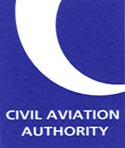 |
ACP-2019-18 Enabling RPAS and RAF Aerobatic Team Operations Out of RAF Waddington |
Airspace Change Proposal ACP-2019-18 has now reached Step 5a: CAA Assessment.
Stage 4b documents have been published:
Stage 4B - ACP Final Submission - Issue 1_Redacted which includes details of the current airspace and proposed changes:
 |
 |
Stage 4A - Consultation Review - Issue 1.0_minus Annex C_Redacted
ACP-2019-18 Final Options Appraisal (Phase III) Issue 1.0
If you have any views or questions about these proposed changes email
- Details
- Published:
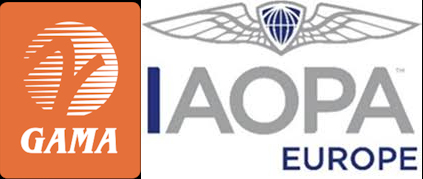 |
The GAMA-IAOPA Europe General Aviation Survey 2023 |
In order to make General Aviation in Europe safer, more affordable and more accessible to the wider public, GAMA and IAOPA have undertaken, with the support of EASA and AERO Messe, to improve the understanding of the size, scope and changes happening in GA across Europe, including the United Kingdom.
Accurate data about the aircraft and their operation is a fundamental enabler for both regulators and industry to successfully target safety improvement initiatives, promotion and rulemaking. Furthermore, more accurate data about General Aviation in Europe can be used to quantify the economic benefits this sector brings to European society and the economy. This is particularly valuable to support political advocacy, such as encouraging grants for new equipment, maintaining local airfields and advocating for more proportionate safety rules.
The aim of this survey is to reach the maximum possible number of aircraft owners/operators in the majority of the 32 EASA Member States amd the United Kingdom every year to allow accurate and representative estimates to be made about General Aviation aircraft operation. Individual Responses are confidential and will not be shared with either the public or regulators, nor will they be used for marketing or any other commercial purposes.
Aggregated Data (European, National or by aircraft category or operation category) will be made publicly available free of charge and shared with regulators such as EASA to support regulatory impact assessments and other uses. Link to the 2023 survey and past reports.
- Details
- Published:
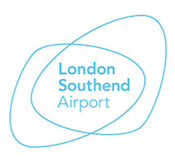 |
London Southend Airport FASI-S Stage 2B |
Following the submission of the Stage 2a and 2b documentation, the CAA has completed the Develop and Assess Gateway Assessment and is not satisfied that the change sponsor (LSA) has met the requirements of the Process up to this point.
The CAA does not approve progress to the next Step. Further explanation for this decision is contained in the published document 'Develop & Assess Gateway Outcome - January 2023', which can be found on the CAA Airspace Change Portal.
LSA will be revising the documentation accordingly and resubmitting in the September 2023 Gateway.
- Details
- Published:
 |
Farnborough Airspace Change Proposal - Post Implementation Review |
The Farnborough Post Implementation Review (PIR) sponsor’s data analysis period has been extended from 28 to 42 days for reasons including the Easter holidays.
Commensurate with this, the stakeholder feedback window will be also expanded from 28 to 42 days. The CAA will send a further notification to inform when the stakeholder feedback window is open.
The CAA's Farnborough Airspace Change Proposal webpage has been updated with this information.
- Details
- Published:
 |
GA Pilot Licensing & Training Simplification – Phase 1: Strategic Direction; Consultation Response Document |
The CAA have published CAP 2532: GA Pilot Licensing Simplification – Phase 1 Consultation Response.
The Executive Summary:
This paper sets out the findings from the consultation on the strategic phase of the GA pilot licensing and training simplification project and sets out key decisions to proceed with the second detail phase of the project.
The consultation was run between 18 October and 16 December 2022, was widely promoted by CAA communications activity, and elicited 1,246 unique formal responses.
Overall direction:
85% of respondents agreed with the need for licensing system simplification, including over half agreeing strongly, indicating a clear mandate from the community to proceed with this project.
74% agreed that this review should go beyond just a simple consolidation of the UK and retained European regulations.
ICAO-compliant PPL:
82% of respondents who had a view (53% overall) supported our proposal for consolidating the full PPL and undertaking a gold-plating assessment of the retained Part-FCL provisions against the requirements in ICAO Annex 1.
Sub-ICAO aeroplane licence consolidation:
90% of those who had a view supported our proposal to consolidate the NPPL(A) and LAPL(A) into a single sub-ICAO aeroplane licence, and even counting those who were undecided still suggests a two-thirds majority in favour.
Sub-ICAO helicopter licence consolidation:
85% of respondents who had a view supported our proposal to simplify the NPPL(H) and LAPL(H) to create a single sub-ICAO helicopter licence.
Syllabus consolidation creating ICAO PPL and PPL(Light):
70% of those who had a view believed our proposal would work in their opinion, with several leaving statements such as; ‘fantastic idea’, ‘very smart’, and ‘just what is needed’ in the comments.
Only 1 in 20 thought the idea was unworkable or was in excess of what is necessary.
IR(R) rating for sub-ICAO licence holders:
65% overall (nearly 90% of those who had a view) supported our proposal of extending the IR(R) to sub-ICAO licence-holders.
Commercial ballooning:
There was strong support (65% of respondents who had a view) to maintain a single balloon pilot licence such as the Part-BFCL Balloon Pilot Licence (BPL) with an appropriate rating for commercial non-passenger operations.
A single balloon pilot licence with a rating for commercial passenger operations was the approach preferred by 58% of the respondents who had a view; suggesting support for the UK Part-BFCL BPL framework.
Sailplane licensing:
There was overwhelming support (88% of respondents who had a view) for proceeding with the implementation of the Sailplane Pilot Licence (SPL).
Honouring/converting licences from the legacy system:
Aside from the unsurprising dislike for ‘immediate mandatory conversion’, there were no overwhelming views towards the other three options.
The most popular (40% in favour) was the ‘deemed valid’ option whereby we would accept the legacy licence as valid as the equivalent new licence; but the second preferred option was our preferred approach of ‘deemed valid until a sunset’, with 25% in favour.
Next steps:
We will brief the community on these findings and also take forward some of the reflective questions set out in this paper to guide further discussion and exploration.
AOPA will continue to be involved with the next steps of this process. During the Phase 1 Working Group, the "AOPA member" was formally representing AOPA and not operating in an individual capacity as stated in the paper.
- Details
- Published:
| Ofcom Launches Online Aircraft Radio Licensing Platform |
The aircraft radio licensing platform is now available, enabling self-service for new applicants and existing licensees to apply for and manage Wireless Telegraphy Act Aircraft licences, which are required to operate radio equipment on board an aircraft.
The service will enable new licence applications to be built, variations to existing licences, surrender of licences, payment of licences and management of contact details.
To access the new system you will need to be a registered user. Please visit the Ofcom licensing portal for aircraft, amateur and ships radio page for more details or Ofcoms Aeronautical licensing page for more information on aircraft radio licences.
For further information or feedback contact
- Details
- Published:
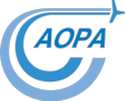 |
The Flying Reporter Aerodrome Review: Manchester, Barton |
AOPA are sponsoring a series of The Flying Reporter Aerodrome review videos with an offer of 25% discount for new 1 Year or 2 Year memberships.
This is the review of Manchester Barton Aerodrome:
- Details
- Published:
 |
CAA - Future Lower Airspace Modernisation |
The UK CAA have published their concepts for modernised Lower Airspace in the UK, presented diagramatically here :
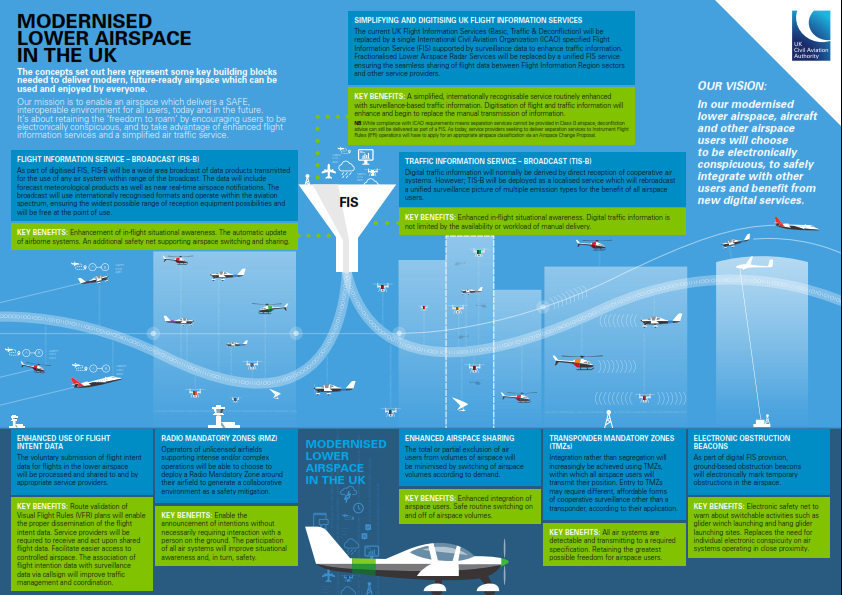
AOPA have been putting the case for GA access to lower airspace in the future and how it might be achieved wthout undue burden on GA, following these underlying principles:
- GA must be able to integrate with future airspace users if GA aircraft are suitably equipped.
- There must be common standards and operating pracitices.
- The cost of any mandatory carriage of compatible equipment should be met by the new users of the airspace, or systems, that require the mandate.
- Provision must be made for access to airspace where mandatory equipment is not, or can not, be carried.
It seems that AOPA has, to some extent, been listened to, but there is still much to be discussed and negotiated. So this vision is a start, but by no means the end. In particular, how is the lower airspace to be managed and GA given the necessary access and services, for VFR traffic in particular. Future Airspace Change proposals must take this into account.
Please take time to consider the concepts presented by the CAA and let me know your views:
Martin Robinson
CEO AOPA UK
- Details
- Published:
 |
Leaded Aviation Fuel used by GA Aircraft |
Leaded Aviation Fuel used in General Aviation - Joint Statement by: AOPA – LAA - BMAA
The University of Kent published a study in September 2022: “Mills, Ashley and Peckham, Stephen (2022) Lead exposure from general aviation emissions in the UK: a review and call for action. Public Health Challenges,1(4). ISSN 2769-2450”
The publication prompted some articles in the press both in the UK and USA. In December 2022, Bloomberg published their article about lead pollution from General Aviation aircraft in the UK with the headline ”UK Underestimated Lead Pollution from Small Private Planes by 14,000 Times, Study Finds”
On 9 January 2023 the Daily Telegraph picked up the story and published it under the scaremongering headline “Aeroplane hobbyists putting thousands at risk of cancer thanks to lead-based fuel”, ironically leading with a stock photo of a CFM Shadow microlight which has a Rotax Engine and, if in the UK, will most probably be running on unleaded petrol (MOGAS).
Globally, light aircraft powered by piston engines have typically used a leaded aviation fuel 100LL (AVGAS). Whilst motors cars were weaned off leaded fuels decades ago, the old designs of aero-engines were not so easily transferred. An unleaded aviation fuel (UL91) has been approved for use with more modern designs and has been cleared for use on some of the traditional engines. However, no universal replacement for 100LL has been approved and several of the higher power engines, typically turbocharged, still need the leaded fuel to run safely
For many years work has attempted to find a fuel standard that would drop in as a replacement for 100LL but this has been unsuccessful to date. A different approach has been introduced by the FAA in the USA which authorises specific aircraft to use an unleaded fuel produced in the USA by GAMI Inc. (G100UL). The breadth of these authorisations is gradually increasing.
The volume of fuel used by piston engine aircraft is relatively small and the supply chain is resistant to further sub-dividing the supply across multiple fuel types.
The University study itself confirms that data held by the Government does not differentiate between leaded and unleaded aviation fuel and the authors make assumptions on the volumes of each fuel used in the UK – there is no indication that aviation fuel suppliers themselves were approached for sales records for either leaded or unleaded aviation fuels.
Efforts have been underway for many years to identify a replacement for 100LL, mostly driven by groups in the USA. Separately, bodies in the USA and Europe are increasingly concerned about the effects of lead in the atmosphere and light aviation’s use of 100LL does not help matters. The move to unleaded fuels should be a higher priority that requires committed Government support. We totally disagree with inflammatory and scaremongering headlines, using demeaning terms like “hobbyist pilots”, lack of balance in articles with no views from the aviation associations.
The reality is that our associations have been working together on the issue in the UK and with our colleagues in Europe and the USA. We want lead out of the fuel asap. At this time, around 70% of aircraft engines can be run on unleaded AVGAS and this would make a substantial improvement in the right direction – it just isn’t available in sufficient locations because:
1. The cost of installing fuel storage and means to dispense the fuel is significant
2. The cost of unleaded UL91 fuel is higher than 100LL fuel because of the lower volumes
3. Delivery costs are higher because the fuel isn’t blended in the UK (typically it comes from Marseille)
4. The supply of UL91 cannot be relied upon and tanks are left empty for weeks or months (suppliers wait to know they can distribute a 33,000 litre tanker load)
5. The Government have not provided any price incentive, e.g. lower duty or grants for infrastructure, to promote the increased use of the fuel
6. Most owners and pilots do not know if their aircraft can safely run on unleaded UL91. The information is in a variety of places and needs research
7. Attempts to create an initial simple mechanism to check suitability of unleaded fuel have been ignored (It was proposed that G-INFO have the data added but no action has been forthcoming)
We are aware of work in Europe that could result in a high performance unleaded aviation fuel and would welcome efforts to demonstrate its applicability so that a blanket approval could be given by the CAA for the full use without the need for individual aircraft owners having to get approval for each aircraft. We are sure that many of our members would wish to help with testing unleaded fuels.
We look to the UK Government to provide the drive to unleaded aviation fuels, investing in UK research and development, testing and production so that we regain a home based industry while we wait for the next generation of sustainable aviation fuels for General Aviation use.
END
- Details
- Published:
 |
RAF Syerston ATZ and TDA update |
An updated hot-spot narrative has been published to inform pilots that a Temporary Danger Area (TDA) will be established at Syerston Aerodrome from 9 January 2023 to 7 April 2023 for Royal Air Force aerobatics team display rehearsals.
Written by the Aerodrome Controlling Authority at RAF Syerston and members of the CAA’s Airspace Infringement Team it has been published on the Airspace & Safety Initiative website following the issue of the AIC Y 115/2022 on 15 December 2022.
- Details
- Published:
 |
Certifying UK registered aircraft after 1 January 2023 |
Clarification on engineer licensing requirements certifying UK registered aircraft
The UK’s exit from the EU and EASA has changed engineering licensing requirements, particularly in relation to what licences are needed to certify a G registered aircraft from the 1 January 2023.
Applications for transfer from EU to UK Part 66 must be submitted to

